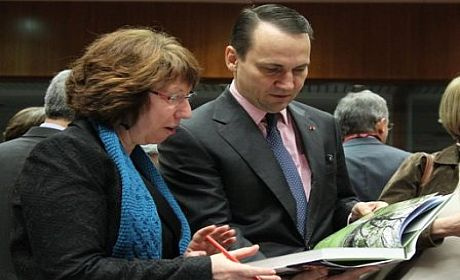West Cautiously Insisting on Assad’s Resignation

What is seen in the foreign policy scene of European countries is not a change of position, but rather a change in operational tactics and techniques caused by feedbacks taken from the heart of the targeted country, i.e. Syria. I do not believe that the US and the European Union have changed their positions with regard to Syria. If we accept that the operational strategies are the product of macro-policies, macro-policies are the product of doctrines and doctrines are the product of paradigms, then neither the US nor Europe have changed their positions with regard to Syria in their paradigms, or in their doctrines, or in their macro-policies and finally in their strategies. But in their techniques and tactics and based on their observations from Syria's operational atmosphere, they have decided to pursue tactical retreats and special technical methods in proportion with their goals. If we accept Mintzberg's idea on strategy, that strategy is the plan, the ploy, and the pattern, and also the position and the perspective, based on the situational structure caused by actions and measures, the Europeans and the Americans have reached the conclusion that they must change their deceitful strategies in order to achieve their defined goals in Syria's operational atmosphere. Today's Syria is an important spot for the Middle East and the Middle East is at the epicenter of the future world order.
Therefore, considering the existing resistance of the government of Bashar Assad and the support of countries like Iran and Russia on one hand, and the uncertain conditions of the post- Assad transitional period, the West attempts to tactically retreat from its positions so that it can:
1. On one hand, buy time to find a desirable government after Bashar Assad
2. The forces of the Syrian army and the opposition who have a radical approach and on one side the al-Qaeda forces and on the other the Syrian army annihilate each other with non-western costs in the operational scene of Syria.
3. The Syrian crisis has turned the attention from the crisis in Israel to Syria and manages international pressure on the actors of the Middle Eastern scene in line with the interests of the West. The Syrian crisis affects the old Middle East dossier meaning the Arab-Israeli peace process and the West, led by the US, can control the radical Netanyahu and impact Iran's nuclear program. Thus, the crisis in Syria can be managed in wide spectrum.
At the same time, it must be pointed out that Iran and Russia's support of Bashar Assad has challenged the West and caused the western countries to manage the psychological war against these two countries especially Iran in the Arab world by exaggerating the crisis in Syria and the aids given by Iran and Russia to Syria. These days, there are reports that Iran's flag is being burnt in some Arab countries. The West is also concerned that the future government which would come to power after Bashar Assad would be more anti-western. Hence, buying time based on these frameworks is being operationalized and consequently changes at a tactical and technical level and the reflections of these changes in the West's strategy with regard to the Syrian crisis mean a strategy of ploy and position.
Sanctions against the government of Syria will continue. But the West will get involved in giving military equipments to the Syrian opposition more cautiously. The concern caused by the situational structure and the future of Syria after the government of Bashar Assad necessitate that the West act with more caution. Since the time when al-Qaeda entered the scene in different forms in the movements of Syria's opposition, the West's doubt in accelerating the achievement of a government after Bashar Assad has increased. I have mentioned several times that the era after Bashar Assad has begun even if Bashar Assad remains in power, for the future government needs a minimum of assurances in this regard.
Military conflict is the last operational step. Military conflict is defined as a strategic power after threatening to use it, for the West considers itself to have the upper hand in its military power against the target country, meaning Syria. But at the same time it does not consider the costs of using military power against Syria a wise action. Thus, military intervention is the last option.
While the government of Syria can use a possible military attack against a country like Turkey as a ploy to change the rules of the game toward its own interests, using such means to escape from the situational structure and the pressures caused by it on the government of Syria and their supporters is very dangerous. Therefore, it seems that using such methods to escape from the existing pressures will not be appropriate and the government of Syria will not easily take such measures. I believe that the installation of the missile defense shield in Turkey is aimed at targets beyond Syria.

